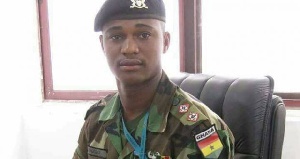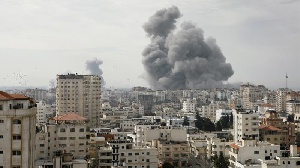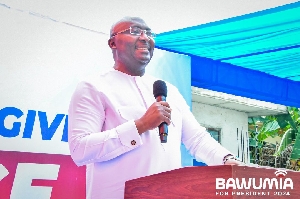Opinions of Sunday, 4 June 2017
Columnist: Israel Laryea
How power to the people may have contributed to mob injustice
I have been thinking long and hard about the tragic lynching of that fine Ghanaian soldier - Captain Maxwell Adam Mahama - who it is emerging was by all standards an officer and a gentleman; and I must confess that a few decades ago, I could easily have found myself as one of those residents at Diaso, Denkyira-Obuasi who would have hailed or possibly hurled a stone too at the unfortunate soldier……..but don't crucify me yet. Here's why I say so.
I grew up at Kuku-Hill which is inside Osu in Accra and spent a few years in a Labone neighbourhood that was very close to La and have witnessed on several occasions how suspected thieves are dealt with; the beating was constant, the parading through the streets towards the police station was also somewhere in the #DealingWithASuspect handbook, but so was the “put the car tyre around his neck and burn him” option. A few times as this happened, I looked on as a child and cheered on and sometimes followed the crowd as the suspect was paraded through the streets. I suspect I probably hurled a stone at one of the suspects too on one of those occasions. There was, however, no mobile phone cameras to capture this and no social media to make the pictures and videos go viral.
Back then, I was so convinced these suspects were guilty of the crimes they had been accused of and so shed no tear for them. As I matured, however, I began to distance myself from these acts even though knowing how vicious armed robbers could be, I would not judge anyone who shot one of them even if he is caught in the act.
…..And as for shooting to kill suspected armed robbers, the police in Ghana appear to have quite a reputation. Heck, they have even been accused of framing as armed robbers, innocent people they have killed in the line of duty.
….But I digress.
Fast forward from my days at Osu-Kuku Hill and Labone and then back to Osu-Kuku Hill where I eventually lost that interest to follow suspects through the streets, I have come to appreciate why such people should be sent to the police station even though, yes, the police and the entire justice system have serious faults. But, flawed as they might be, the option of using them is better than instant justice, which may turn out to be an injustice as in Captain Mahama's case.
Captain Adam Mahama's death, though unfortunate has helped us all to realise, though many wouldn't want to admit publicly, that most of us are not very different from the people who participated in his lynching, except education, exposure and other factors would not permit us.
We, therefore, have a fine opportunity to use this tragedy to remind us all that not all suspects are guilty and that the next person we see being lynched may be another Captain Mahama, an honourable soldier, who went to Akosombo International School and who has a young family and great prospects.
…..But from where did this mob mentality originate? There have been attempts to answer this question and so I would make an attempt too.
Could it be from the heady days of the revolution when soldiers and cadres picked on the wealthy in society and seized their properties because they were suspected to have looted from the state? When Makola women were stripped and drilled in public for engaging in Kalabule?
Indeed, people were shot simply for amassing too much wealth. I believe the examples are many. Those were the days we chanted, "power to the people", which also meant, take the law into your own hands. My suspicion is that this was how we came to find as acceptable, the “people's justice.”
Call it the overthrow of the justice delivery system and you will not be wrong.
The people's power mentality hasn't been all bad though. Because it is that same mentality that drives us to go to the rescue of accident victims in the absence of an effective ambulance service. It is that same mentality that gets us to want to rush to douse fires with buckets of water well before the fire service arrives.
It is also that same mentality that drives us to shout for help when thieves invade our homes rather than call the police and which gets our neighbours to come to our rescue before the police arrive, that is if they come at all.
So all is not lost after all, as far as our power to the people mindset is concerned and which may have in a way contributed to the culture of mob justice/injustice, which is blamed for the death of Captain Adam Mahama.
We should use it as a rallying point to put the people's power to good use, but also get our systems to work so that the people will gradually hand power back to the police, once they know when the police is called, they will arrive in good time; that once a case is reported, it will be dealt with; that when an ambulance is called, it will come to aid accident victims in good time so we don't have to bundle them into taxis and the buckets of pick-ups where often we compound their situation rather than save their lives.
#RIPCaptainMahama #SayNoToLynching













